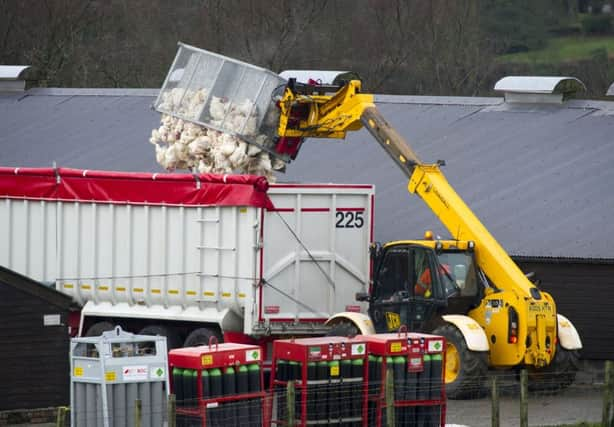Cull of 40,000 chickens begins at bird flu farm


Craigies poultry farm in Dunfermline, Fife, has been in lockdown since Sunday, when infection was first suspected.
Laboratory tests later confirmed the presence of H5N1 avian influenza – a virus that has killed millions of birds in Asia and Africa and spread to humans in some cases.
Advertisement
Hide AdAdvertisement
Hide AdDisease experts say the strain found is “very mild”, but a one kilometre control zone remains in place and all poultry keepers are urged to remain vigilant.
Food standards officials believe the outbreak poses no risk to people.
However, government officials ordered a cull of the farm’s stock to prevent any spread of the disease, which it is feared could cause a devastating pandemic if it were to combine with the human flu virus.
A lorry carrying metal cages and tanks of argon and nitrogen gases to be used in the cull arrived on site on Tuesday.
Specialists from the UK government’s Animal and Plant Health Agency (APHA) have been called in to carry out the cull, which is expected to take two days.
Dressed in protective bodysuits, they are using approved extermination methods.
“Fully trained, experienced and licensed contractors will undertake the culling using containerised gassing techniques developed with the involvement of the Humane Slaughter Association,” said an APHA spokeswoman.
“Carcases will be disposed of by rendering, undertaken at an approved plant.
Advertisement
Hide AdAdvertisement
Hide Ad“This follows a similar approach to that successfully used for the disposal of carcases during previous outbreaks of exotic animal disease.”
Scotland’s chief vet Sheila Voas said: “The process of humanely culling all of the birds on the farm is now under way, and the 1km restrictions around the premises will remain in force for 21 days after preliminary cleansing and disinfection.”
Eggs produced by broiler breeder Craigies are not for human consumption but are sent to a hatchery. As a precaution, the eggs are being destroyed and the movement of poultry products and animals at the farm suspended.
The source of the outbreak has not yet been identified, but wild birds, particularly waterfowl, are known to play a part.